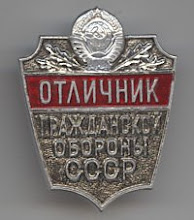I apologize for the lengthy interlude since my last posting. I've been tied up with end-of-the-semester responsibilities.
One of the great frustrations of my field of study is the fact that it is (to my judgment) dominated by people who aren't very knowledgeable about the real issues. My specialty is the history of nuclear technology in the Soviet Union, but the study of the nuclear arms race is dominated by Americanists. These fall into two categories:
1. Cold War Triumphalists. The premier example of these is John Lewis Gaddis, the "doyen" of Cold War studies. The problem with these scholars is that they generally know little or nothing about the USSR, so their historical narratives are very one -sided. They also tend to have little or no technical knowledge about nuclear technology. Although historians in this category are often famous, they're actually fairly rare in my experience.
2. Peace Movement Hagiographers. A good example of one of these is Lawrence S. Wittner, who wrote an enormous three-volume history of the anti-nuclear movement that claims that it was the efforts of protesters that shaped the history and outcome of the arms race. These scholars tend to glorify the peace movement because they participated in it themselves. Unfortunately, this generally blinds them to the fact that the movement was and is an utter failure. These scholars dominate the nuclear field outside of political and military history- i.e., they tend to write histories of Atomic Culture. At the same time, they generally have no knowledge of the USSR or nuclear technology either.
In my view, both of these groups are deficient. No-one without at least a superficial knowledge of Soviet history and culture can claim to understand the dynamics of the arms race. This is not to say that there aren't some fine scholars (and some fine scholarship) in both categories; it's just that most of what's been written is just plain inadequate.
What causes problems for me is that my particular sub-field (civil defense) is dominated by a particularly uninformed and dogmatic division of the latter group. All of them are Americanists, and the average level of scholarship is simply abysmal. There are some exceptions to the rule- I value Kenneth L. Rose's One Nation Underground and Laura McEnaney's Civil Defense Begins At Home. Neither of these scholars is knowledgeable about Russian history, nor are they experts on nuclear weapons effects; however, their arguments are restrained and fairly well-researched.
And then there's this.
It's kind of hard to describe my enormous frustration with this book. As someone who has done extensive archival (and non-archival) research on civil defense, I can assure you that the author's thesis (that the "civil defense protest movement" killed civil defense) is totally unsupported by the historical record. It's also obvious if you search old H-Net postings that she came up with this idea back in the early 1990s, and that she had decided before doing her research that this would be her argument. (A little aside: I used to have this kind of take on civil defense too. Then I went to the National Archives and went though Record Group 304.) In any case, check out the endorsement from Helen Caldicott herself!
My problem is that these are probably the people that are going to review my research when I submit it for publication. No amount of fact or reason will save me from the fact that they are simply anti-nuclear. I'm hoping the worst of them retire soon.
Sunday, December 09, 2007
Subscribe to:
Post Comments (Atom)

3 comments:
A question since it is your area of expertise: do you think Hollaway does a good job in "Stalin and the Bomb"? What about Richard Rhodes in "Dark Sun"?
http://nucleardreams.wordpress.com
Holloway is, hands-down, the best book on the topic in Russian or English. I'm a big fan of it, and I'm eagerly awaiting the book Holloway is writing right now on the Soviet nuclear weapons program. That said, Stalin and the Bomb is not definitive- I disagree with Holloway on a number of points, particularly regarding Stalin's personal agency in managing the bomb program. (It should be kept in mind that even Stalin's closest associates did not understand his psychology, so we historians are even more in the dark.) If you're interested in Stalinist science or late Stalinism in general, I highly recommend a book called Stalin and the Soviet Science Wars- it's about Stalin's personal intervention in Soviet science in the postwar years.
As for Dark Sun, I'm ashamed to admit I haven't gotten around to reading it yet. (As my official specialization is Russian history, I'm loaded down with reading on that topic- I don't get much time for outside pursuits.) I know that Rhodes has an excellent reputation, but I can't say much beyond that.
Thanks for the recommendation. Do read Rhodes. His recounting of Soviet espionage is fascinating and so is everything else he writes. I am a big fan. But I guess there might be some new unearthed material he might have missed.
Incidentally Rhodes talked about his new book on the nuclear arms race on C-SPAN recently. Here is the link to the video. That book is great too.
http://www.booktv.org/program.aspx?ProgramId=8848&SectionName=&PlayMedia=No
Post a Comment